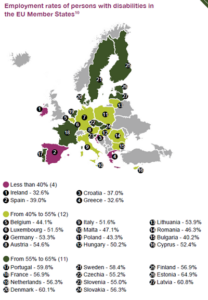
The European Disability Forum’s new Human Rights report “Right to Work “, reveals the persistent gap in access to quality employment for persons with disabilities. The report shows that only 51.3% of active, working-age persons with disabilities in the EU are in paid employment. Furthermore, women and young people are at a disadvantage: only 49% of women and 47.4% of young people with disabilities are in paid employment.
The situation is especially bad in 4 EU countries. Greece and Ireland lead this “hall of shame”, with less than a third (32.6%) of persons with disabilities employed. Croatia follows with only 37% and Spain with 39%.
It gets worse when considering full-time employment, especially for women with disabilities. In 11 countries, less than 20% of women with disabilities are employed full-time. Among the offenders: Ireland, Belgium, Spain, Italy, Malta, Poland, Hungary, Croatia, Romania, Bulgaria, and Greece. This is despite women with disabilities being, on average, more educated than men with disabilities.
The chasm between employment rates of persons with disabilities and without disabilities – the “disability employment gap” – is clear, and it varies wildly. The EU average is 24.4 percentage points – but the gaps in the worst-performing Member States are much wider: Ireland -at nearly 40 percentage points – 38.6; Belgium – 36.3 percentage points; and Bulgaria – 33 percentage points). The lowest gap (Portugal) is still 18.2 percentage points.
You can find full report on the European Disability Forum’s website. It looks into the various factors that affect the employment rate of disabled people.
